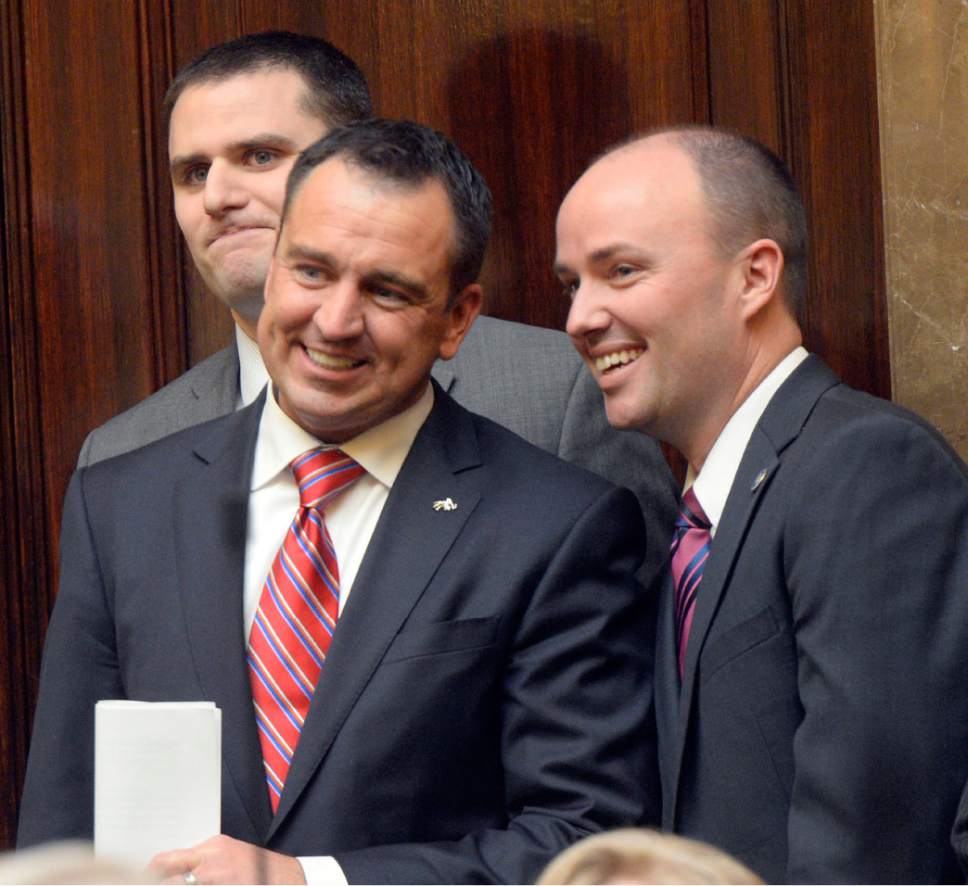This is an archived article that was published on sltrib.com in 2016, and information in the article may be outdated. It is provided only for personal research purposes and may not be reprinted.
If you want to talk about winners and losers in the aftermath of Donald Trump's stunning upset victory in the presidential race Tuesday, House Speaker Greg Hughes and Lt. Gov. Spencer Cox would have to be in the discussion.
But who is the winner and who is the loser probably depends on how popular Trump is viewed as president over the next four years.
Hughes and Cox are frequently mentioned as Republican rising stars who could be in the mix for higher office, such as governor in the next four years, so we'll see how their opposite roles during the presidential campaign affect their political futures.
Hughes was the first high-profile Utah official to endorse Trump in the face of most Utah Republican notables backing Sen. Ted Cruz, with a few for Gov. John Kasich.
And at the time, Hughes paid dearly. He was derided for the Trump endorsement, particularly in light of 2012 presidential candidate and Utah darling Mitt Romney's harsh public denouncement of Trump as a "phony" and a "fraud."
Delegates at the Utah State Republican Convention elected a Cruz slate of delegates to represent the Beehive State at the GOP national convention in Cleveland.
While Trump already had enough committed delegate votes from the Republican primaries and caucuses to secure the nomination, the Utah delegation was in the forefront of an attempted coup to wrest the bid from Trump and give it to Cruz.
One of the leaders of that coup was none other than Utah's junior senator, Mike Lee, who was a steadfast anti-Trump advocate.
The Utah delegation earned a reputation as spoilers at the convention, with the nickname the "no-clap" delegation while most of the convention celebrated Trump, Hughes, who was denied a national delegate spot because of his Trump support, was an invited guest in the Trump suite during the convention, sitting with the nominee's family.
Hughes had been an early supporter of Marco Rubio for the GOP nomination, but when Rubio suspended his campaign after Trump won the Florida primary, Hughes was contacted by the Trump campaign to see if he could come over to their side. He had earlier met Trump's son Donald Jr.
Some Republicans close to Hughes speculate whether the speaker might be offered a job in the Trump administration, but Hughes said he has no knowledge of that even being a possibility.
Cox, meanwhile, was one of the first Utah Republicans — not counting Mitt Romney, of course — to publicly give Trump a wholesale condemnation.
"If there were some major changes to Trump, I think there's a way many of us could support him, but he hasn't shown any inclination toward those changes or doing things differently, so I think it's a long shot that he will change," Cox said during an interview with The Salt Lake Tribune in August.
Trump struggled with approval ratings in Utah most of the campaign and at one point it looked as though he would come in second in the Beehive State to independent Evan McMullin, who hyped his membership in The Church of Jesus Christ of Latter-day Saints to boost his popularity in the state.
But Trump ended up carrying Utah with about 48 percent of the vote and, if Republicans in the state warm up to him over the next four years, Hughes could look pretty good.
If Trump flops and Republicans are disappointed by 2020, Cox would look like the smarter one.
But any contest between those two rising stars in the GOP could be moot if incumbent Gov. Gary Herbert turns into an Orrin Hatch and decides to run for another term. —



